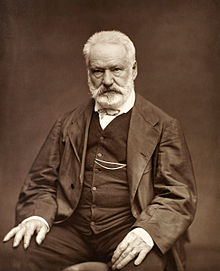Victor Hugo
|
Victor Hugo Peer of France |
|
|---|---|

Woodburytype of Hugo by Étienne Carjat, 1876
|
|
|
Member of the Senate for Seine |
|
|
In office 30 January 1876 – 22 May 1885 |
|
| Succeeded by | Jacques Songeon |
| Constituency | Paris |
|
Member of the National Assembly for Gironde |
|
|
In office 9 February 1871 – 1 March 1871 |
|
| Succeeded by | Unknown |
| Constituency | Bordeaux |
|
Member of the National Assembly for Seine |
|
|
In office 24 April 1848 – 3 December 1851 |
|
| Constituency | Paris |
| Member of the Chamber of Peer | |
|
In office 13 April 1845 – 23 February 1848 |
|
| Appointed by | Louis Philippe I |
| Member of the Académie française | |
|
In office 7 January 1841 – 22 May 1885 |
|
| Preceded by | Népomucène Lemercier |
| Succeeded by | Leconte de Lisle |
| Personal details | |
| Born |
Victor Marie Hugo 26 February 1802 Besançon, Doubs, France |
| Died | 22 May 1885 (aged 83) Paris, France |
| Resting place | Panthéon, Paris |
| Nationality | French |
| Political party |
Party of Order (1848–51) Independent liberal (1871) Republican Union (1876–85) |
| Spouse(s) | Adèle Foucher (m. 1822; her d. 1868) |
| Children |
|
| Education | Lycée Louis-le-Grand |
| Occupation | Writer, poet, journalist, drawer |
| Religion | Deism (baptized Catholic) |
| Writing career | |
| Period | 19th century |
| Genre | Novel, dramaturgy, theatre, poetry |
| Literary movement | Romanticism |
| Notable works | |
| Years active | 1829–1883 |
|
|
|
| Signature | |
Victor Marie Hugo (/ˈhjuːɡoʊ/;French: [viktɔʁ maʁi yɡo]; 26 February 1802 – 22 May 1885) was a French poet, novelist, and dramatist of the Romantic movement. He is considered one of the greatest and best-known French writers. Outside France, his best-known works are the novels Les Misérables, 1862, and The Hunchback of Notre-Dame (French: Notre-Dame de Paris), 1831. In France, Hugo is known primarily for his poetry collections, such as Les Contemplations (The Contemplations) and La Légende des siècles (The Legend of the Ages). He produced more than 4,000 drawings, and also campaigned for social causes such as the abolition of capital punishment.
Though a committed royalist when he was young, Hugo's views changed as the decades passed, and he became a passionate supporter of republicanism; his work touches upon most of the political and social issues and the artistic trends of his time. He is buried in the Panthéon in Paris. His legacy has been honoured in many ways, including his portrait being placed on French currency.
Victor Hugo coat of arms
Joseph Hugo and his sons
Hugo maternal grandmother Renée-Louise Trébuchet
Hugo maternal grandfather Jean-François Trébuchet
Hugo was the third son of Joseph Léopold Sigisbert Hugo (1774–1828) and Sophie Trébuchet (1772–1821); his brothers were Abel Joseph Hugo (1798–1855) and Eugène Hugo (1800–1837). He was born in 1802 in Besançon in the eastern region of Franche-Comté. Léopold Hugo was a freethinking republican who considered Napoleon a hero; by contrast Sophie Hugo was a Catholic Royalist who was intimately involved with her possible lover General Victor Lahorie, who was executed in 1812 for plotting against Napoleon.
...
Wikipedia
